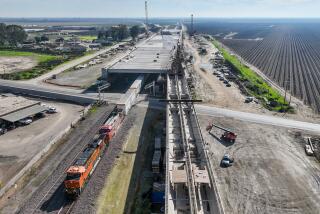Refusal to Let RTD Do Audit Called a Threat to Funding : Transit: The RTD says federal money could be at risk. The County Transportation Commission counters that its own review is sufficient.
- Share via
The president of the Southern California Rapid Transit District board has warned that the Los Angeles County Transportation Commission is endangering future federal transportation aid by preventing the RTD from independently auditing Metro Red Line construction funds.
In letters mailed Monday to Supervisor Mike Antonovich, Mayor Tom Bradley and City Council President John Ferraro, Marvin L. Holen asserted that unless the federal funds are audited soon, “the continued flow of federal funding . . . (will be) put at risk.”
LACTC Executive Director Neil Peterson said the RTD audit would be redundant and a waste of money. On Monday, he circulated a memo to the commission and RTD board members that proposed to end the dispute by amending federal law to eliminate the RTD from the project.
The two transit agencies--bitter rivals in the midst of a state-mandated merger--share responsibility for building the Union Station-to-MacArthur Park subway, scheduled to open in June, 1993.
Holen, in his sharply worded letter to the elected officials, insisted that an RTD audit is essential.
“Whenever management in any organization appears to be avoiding a legitimate audit of its affairs, it needlessly arouses suspicion and brings into question the financial integrity of the organization,” he concluded. “This is something the LACTC management can ill afford at a time when the credibility of the LACTC has already been seriously challenged.”
The LACTC, under fire for lavish expense accounts and lax auditing of consultant spending, has offered to include RTD auditors in the commission’s routine internal audit team, but the RTD asserts that such an action is forbidden by federal rules because it amounts to the RTD rubber-stamping an LACTC audit of itself.
Bradley, for one, took the warning cautiously.
“There are two transit agencies involved in the matter and two sides to the story,” the mayor said through his press secretary, Bill Chandler.
“The mayor has asked his staff to look into it. Besides that, it’s too early to say anything,” Chandler added.
Ferraro, noting that the Los Angeles City Council is increasingly concerned about how the LACTC is spending the city’s $134-million share of the construction tab, said he will write to the LACTC, asking it to allow the RTD audit. “I think they should reply to the request of the RTD,” he said.
Antonovich, who is also chairman of the LACTC board, did not publicly respond to Holen’s letter Tuesday, nor did federal officials. Stewart Taylor, regional administrator for the Federal Transportation Administration, left his office Tuesday morning and did not return.
The RTD began the job of building the 4.4-mile first leg of the subway, and relied on federal grants for about half of the project’s $1.45-billion budget. After allegations of huge overruns and delays, construction management in 1990 was turned over to the LACTC. However, the federal grants remained the RTD’s responsibility.
The Federal Transportation Administration said in a 1991 letter to the RTD that the transit district remained responsible for ensuring the “proper expenditure of project funds . . . (in) compliance with all terms and conditions of its grant agreement.”
RTD Inspector General Ernesto V. Fuentes said federal auditors would pore over project records once the Red Line starts running. The federal officials would probably disallow spending federal money for any improper or inadequately documented expenses, he said, and could ask the RTD to reimburse the money.
To reduce the likelihood of that, Fuentes said, he asked the LACTC in January to cooperate in a “compliance audit” to make sure that both the RTD and the LACTC were properly documenting expenses. Fuentes said LACTC officials denied him access to their records, even during a scheduled appointment, asserting that independent audits already had been done by outside agencies and the LACTC’s own internal audit department.
Fuentes said he was denied access to those records, too. Those audits would not by themselves fulfill the RTD’s oversight responsibility, he said, but they would make a full RTD audit faster and easier.
“There isn’t any auditing independence if we allow the LACTC to audit itself,” he said.
In any case, he added, there is no indication that the LACTC will agree to an RTD audit at any time before the project is finished.
“There is not a deadline, really,” Fuentes said, “but when an auditee refuses access to a grantee to make sure how its money is being spent, that makes it a crisis.”
More to Read
Sign up for Essential California
The most important California stories and recommendations in your inbox every morning.
You may occasionally receive promotional content from the Los Angeles Times.










